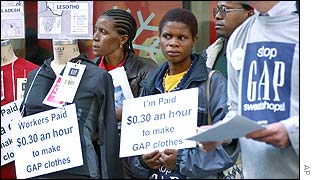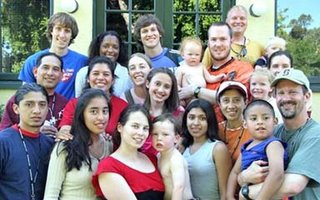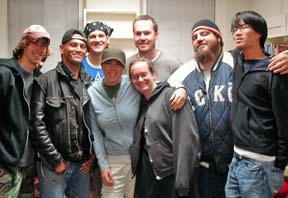So I've only been in the U.K. for a little over 2 months now but there's something that I've been noticing, and even though I'm not here that long yet, I still want to begin commenting on it.
Over the past 4 years when I was studying at Wheaton, I found myself involved with Christians who had a particular understanding of what Jesus' message was all about, it was my interaction with these people, communities, and ideas, along with God's incredible grace that kept me from throwing away my faith altogether. There's lots of ways people use to describe these Christians; some involve big theological definitions, some other terms are more derogatory, but the one (which I still don't like, but which I think most people understand) is basically these were "social justice" christians or maybe a better one is "wholistic" Christians. These people were trying to understand and live out the message of Jesus which involves both word and deed, basically speaking love and showing love.
Anyway, naturally being in a new place I've been trying to connect myself with these types of christians here, and I have found some really good groups of people. It's interesting though, but I'm finding that although these people hold sort of the same understanding of Christianity as my friends back at Wheaton did, their approach and ideals are quite a bit different. And I think that's a really good thing, the more i look into it the more i think we have to learn from one another.
Christians I've met in the UK are passionately concerned with structural, societal and environmental justice. They campaign for issues such as Fair Trade, and buying Organic food. They advocate what people call "Ethical" living. What I've come to understand by that term is that it means, trying to live a life where your purchases were produced fairly and safely, where you're day to day life has as little negative impact on the environment as possible and where even the money in your bank account savings is not being invested in unethical activities (such as the arms-trade).
 These Christians wouldn't wear Gap (probably close to a sin), or buy "super cheap" things (at places like Primark- like a K-Mart), because if something is super cheap it has most likely exploited someone.
These Christians wouldn't wear Gap (probably close to a sin), or buy "super cheap" things (at places like Primark- like a K-Mart), because if something is super cheap it has most likely exploited someone.There is the understanding here that if you spend just that bit extra you are ensuring justice for the person you've bought it from (of course it's not that simple, but that's the general gist).

Churches hold Fair Trade Sales, and at my church a woman sells ecologically friendly cleaning supplies everyweek at the back by the information table. The last church I visited had successfully campaigned to have Southampton become a Fair Trade city.
 In America however, although SJ christians are aware of these issues(Fair Trade, organic, non-GM modified food) they are not the focus, and usually less effort is put into them (I think i'd make an exception for Shane Claiborne though...who makes his own clothes). More effort/intention goes into the personal and relational side of justice issues. More common issues such as: where you live (whether in the subarbs - a seemingly cardinal sin- or in shafted areas -i.e. 'where Jesus would live......'), Racial Reconciliation, Who you spend you're time with, and Learning not Teaching become primary.
In America however, although SJ christians are aware of these issues(Fair Trade, organic, non-GM modified food) they are not the focus, and usually less effort is put into them (I think i'd make an exception for Shane Claiborne though...who makes his own clothes). More effort/intention goes into the personal and relational side of justice issues. More common issues such as: where you live (whether in the subarbs - a seemingly cardinal sin- or in shafted areas -i.e. 'where Jesus would live......'), Racial Reconciliation, Who you spend you're time with, and Learning not Teaching become primary.The mantra of some of the American SJ christians might be as Viv Grigg said (I think quoting someone else) "Earn as much as you can, Spend as little as you can and Give generously." People frequent the shops that UK SJ christians would think sinful, they buy the super cheap foods, they buy the super cheap clothes (well in fairness few clothes are bought at all, holes are a matter of spiritual maturity wherever you go). But they do this for the greater value of "identifying" with others, with the outcast and the shafted. The way of life is rather called "Simple Living" on that side of the pond.
I have to admit I'm not here long enough to even begin trying to understand UK multi-ethnic relations, from what little i've talked to people, I keep getting different opinions, and all I can tell so far is that the situation here is VASTLY different from the US and also from Ireland, who untill recently had never seen any sort of economic immigrants from other parts of the world. So with that in mind I won't even venture to see the Church deals with "racial-reconciliation" if that phrase even makes sense here.

Anyway, my point is that we need to learn from each other as we all have potential pitfalls. We need to be acutely aware of how we (wherever we are in the world) are part of intertwined webs of connection that mean what I buy in my local Tesco has an effect on someone living in Peru, or Spain. And that the clothes I wear, may be the handywork of exploited children and other economic slaves. Taking care of the environment is not an "add-on" for Christian faith, but is central to Christain doctrine from the very begining..... (try to answer the question of "what humans were originally meant to do?" without thinking about this).
At the same time, we must never forget that what is just as important is how we live our lives locally. As Shane Claiborne puts it (the poor don't need your money, they need your time, your relationship -). If we truly believe that the roots of "poverty" come from broken, perverted, and misused relationships, then it is only through relationship that "poverty" will be alieviated.

One of the quotes on my facebook page is by Mother Teresa of Calcutta, "It is easy to love the people far away. It is not always easy to love those close to us. It is easier to give a cup of rice to relieve hunger than to relieve the loneliness and pain of someone unloved in our own home. Bring love into your home for this is where our love for each other must start." That quote always cuts me deep..... how can I so be concerned about others far away when I treat my family so badly?

Our living out Christ's love must both be local and global, as we in a globalized world are very much connected to both levels. However, we must remember that one thing that separates Christian social action from it's secular or governmental cousins is that if something is Christian (i.e. following the example of Christ) it must be necessarily personal and relational for this is how Christ shows himself to us.


4 comments:
Wow. Good thoughts. Though the presence of "social justice" Christians in America, as you know, is certainly not a given. It's tough sometimes to find Christians in NE who are committed to ANY of the things you talked about as a way of life.
Having spent a good deal of the last four years in the "Bible Belt(misnomer of misnomers)" you see what is important. Potlucks and social events are the daily bread of Southern America(gross use of geographical terms). Fair trade, non-gmo, and generally taking care of the planet is viewed as communism or liberal enough to affect what they really worship. Christianity and Capitalism are synonymous in the South.
Deep thoughts. Thank you for putting those out there and please keep thoughts on these topics coming. The Mother Theresa quote also cuts me pretty deep. It may help me answer the question of what I'm going to do next year.
I think the Viv Grigg quote was probably a paraphrase from John Wesley thoughts on "Giving".
http://www.cambridgestudycenter.com/giving/wesley.htm
Post a Comment